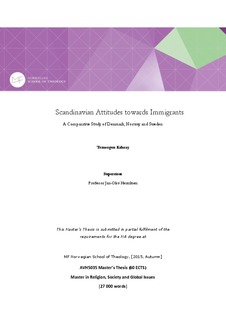| dc.description.abstract | In the last few decades immigration from many parts of the world has transformed Scandinavian countries from once homogenous societies to multicultural countries. Immigrants and their off-springs constitute 10 to 15% of the populations in Denmark, Norway and Sweden. The arrival of immigrants has been varying from time to time depending on the prevailing economic and political situations. Similarly the reaction of host societies towards immigrants and their impact on the economy, culture and politics has been dependent on the particular socioeconomic and social psychological circumstances of individuals residing in these societies. Using data from the European Values Survey in 2008, this thesis explores the factors that determine attitudes towards immigrants. The results indicate that Scandinavian attitudes towards immigrants are driven more by concerns about identity and politics than economy. National identity, particularly, its ethnic expression is the most important predictor of attitudes towards immigrants. Following ethnic identity, it is politics, especially self-placement on the left-right spectrum of political views is that explains attitudes towards immigrants. | nb_NO |
